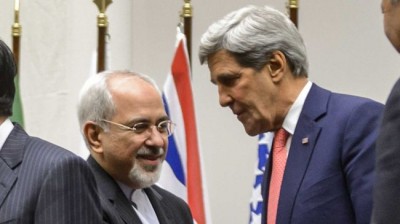 U.S. Secretary of State John Kerry spent all day Wednesday in Geneva talking about Iran’s nuclear program with Iranian Foreign Minister Javad Zarif.
U.S. Secretary of State John Kerry spent all day Wednesday in Geneva talking about Iran’s nuclear program with Iranian Foreign Minister Javad Zarif.
They held morning and afternoon sessions and an unscheduled evening meeting, for which Kerry postponed a flight to Bulgaria. A U.S. official said the talks were substantive.
The talks came before diplomats from Britain, China, France, Germany, Russia and the U.S. resume their talks with Iran, looking to reach a final deal by a July 1 deadline.
Speaking earlier, Zarif said his meetings with Kerry showed that Iran and the so-called P5+1 countries were ready to “speed up” their negotiations.
“I think [this round of talks] will show the readiness of the two parties to move forward, to speed up the process,” said Zarif.
But he placed the burden for reaching an agreement on the U.S. and the five other countries.
“We have reached a stage that it is necessary for the other side to make its decisions so that we could move forward. In our opinion, reaching a deal is completely possible, but a political decision and will is needed. The Islamic Republic of Iran has shown that it has such will at all levels,” he said.
Zarif declined to detail the issues that divide the negotiators.
“All issues are hard until we resolve them,” he said, “and all issues are easy if we resolve them.”
Kerry did not comment before the initial Wednesday meeting. He said earlier this week that his discussions with Zarif would be a chance for the diplomats to assess where the two sides stand.
Full negotiations are to resume Sunday.
It has been two months since the two sides decided to extend the negotiations after failing to agree by their self-imposed November deadline.
Now, about six weeks remain before their goal of having a framework in place for a deal that would address concerns about possible military applications of the Iranian nuclear program in exchange for easing sanctions that have hurt the country’s economy.
Middle East expert James Phillips of the Heritage Foundation said that “at best,” the P5+1 group could get “a great extension of the time needed for Iran to stage a nuclear breakout. But it won’t be able to get guarantees that there will be no breakout.”
Iran says its nuclear program is solely for peaceful purposes, a claim that the United States and its allies do not believe — hence, the sanctions on Iran that experts say are seriously hurting the country’s economy.
“Oil exports from Iran have been cut roughly from 2.5 million to 1 million barrels a day,” said Allen Keiswetter of Washington’s Middle East Institute. “Furthermore, the price of oil has now dropped by about 50 percent. So, you are looking at Iran receiving 20 to 25 percent of the revenues that it did previously.”
Tehran’s uranium enrichment capacity and the speed at which economic sanctions should be lifted are reported to be the major outstanding differences between the two sides. Iran may be trying to use the negotiations to ease the economic sanctions without giving up much of its nuclear capability, according to Phillips.
“Iran wants to wriggle out of sanctions without foreclosing its nuclear options,” he said. “That is, it wants to weaken sanctions as much as possible but it doesn’t want to definitively give up its nuclear option. And unfortunately, that won’t work for the U.S.”
But other experts are more optimistic about the prospects for agreement, saying both sides stand to gain a lot if they succeed.
“We are very eager to stop all the routes for Iran to obtain a nuclear weapon, and this would be a big, big victory,” Keiswetter said. “On the Iranian side, it could lift the sanctions and open up routes for Iran to reintegrate into the world economy.”
Both Iran and the United States have expressed hope they will make progress at the upcoming talks. However, they may not agree with each other’s version of what the progress may look like.
VOA

Leave a Reply
You must be logged in to post a comment.